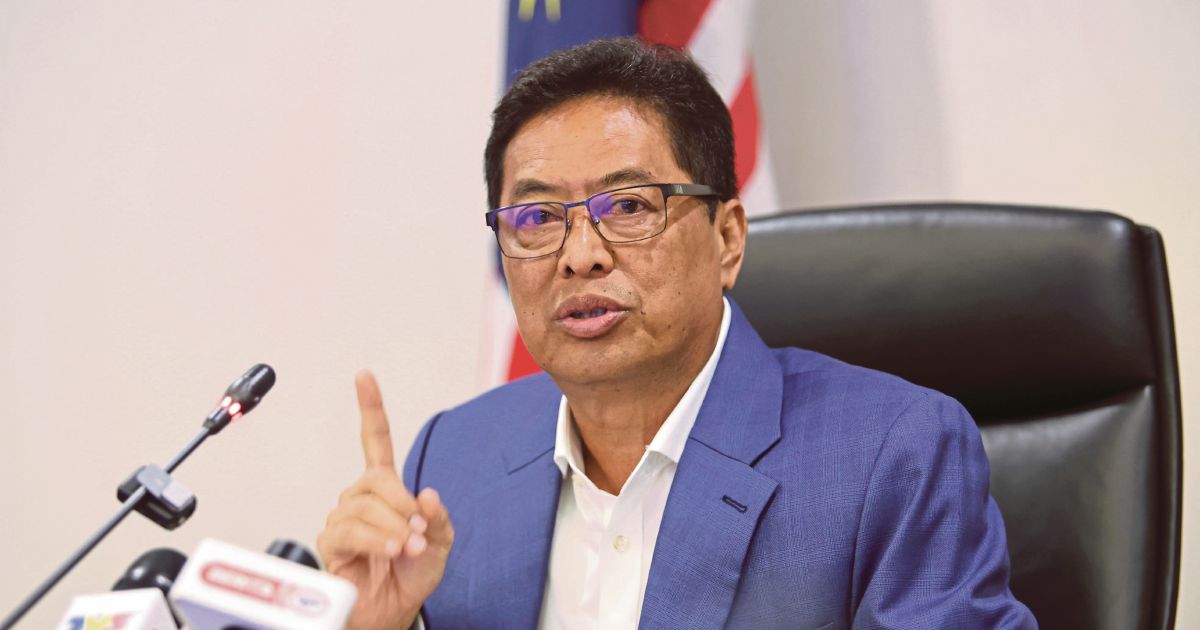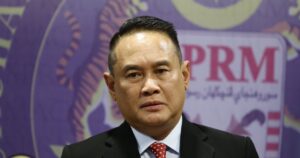KUALA LUMPUR: Malaysia is entering a new chapter in its war against corruption, where artificial intelligence (AI) and sweeping institutional reforms are reshaping governance.
The Malaysian Anti-Corruption Commission (MACC), under the leadership of Chief Commissioner Tan Sri Azam Baki, has placed digitalisation at the centre of its operations, while at the same time, pursuing educational, legal and private sector reforms through the National Anti-Corruption Strategy (NACS) 2024–2028.
Azam said AI is no longer a futuristic concept, but a practical weapon to detect, monitor and prevent corrupt practices.
He was speaking in a special interview with the media at the MACC headquarters here recently.
“By removing many of the human touchpoints in administrative processes, digitalisation reduces the opportunities for bribery, manipulation and abuse of power.
“More importantly, AI equips investigators with predictive capabilities, allowing anomalies to be flagged before they turn into scandals,” he said.
He said the MACC has adopted a suite of advanced systems designed to cover every stage of anti-corruption work.
“Natural language processing is deployed to sift through vast amounts of unstructured data, while conversational AI tools analyse queries and provide responses across structured and unstructured sources.
“Open-source intelligence platforms help profile individuals and trace digital footprints in the early stages of investigations,” he said, adding that optical character recognition tools have been introduced to improve the accuracy of digitised documents, and automation platforms can speed up data preparation and highlight suspicious trends.
He said interactive dashboards powered by business intelligence software are now giving investigators real-time oversight of cases and resources.
“Beyond investigations, AI is being applied to governance itself.
“Complaint management platforms streamline the handling of whistleblower reports, while exhibit management systems ensure that evidence is logged and tracked digitally,” he said, adding that integrity dashboards and centralised reporting systems allow the MACC and other agencies to coordinate their oversight of ministries and state bodies.
Azam said even biometric data is being digitised through the MACC Fingerprint Information System, which maintains records of offenders in corruption cases.
“The commission has also redefined how it communicates with the public. This year, it has launched ‘Sara’, a digital ambassador on Tik Tok, whose name stands for Saya Anti-Rasuah.
“Powered by conversational AI, Sara can deliver anti-corruption messages and engage younger audiences directly,” he said, adding that together with AI content-generation technologies, such as Resemble AI, Dreamface and Heygen, the MACC has produced high-quality campaigns without conventional filming.
He said these efforts were recognised at the 5th Asean PR Excellence Awards, where the commission won the “Best Communication Use of Social Media” award, alongside further honours for crisis management and public relations.
But Azam is also equally frank about the dangers of unregulated AI, pointing to risks such as deepfakes, bot-driven disinformation and manipulated datasets that can erode trust in institutions.
“To mitigate this, the government has launched the Artificial Intelligence Governance and Ethics Guidelines in 2024,” he said.
Any decision made using AI must be auditable and open to scrutiny.
“AI must never replace human responsibility,” Azam said.
“It should complement decisions, not strip away accountability”.
BUILDING INTEGRITY
Azam said if AI is the shield and sword in this battle, NACS provides the wider scaffolding for reform.
“The strategy, launched in May 2024, is designed to ensure that anti-corruption measures translate into benefits that citizens can feel.
“The focus is no longer on producing thick documents of promises, but on ensuring delivery at the grassroots level,” he said, adding that a key element of this delivery lies in education from the earliest stage of life.
Azam said anti-corruption awareness is being introduced even at the preschool level, using illustrated comics, digital modules and an anti-corruption hero mascot to make lessons engaging.
“Children learn best through activity, not just books,” he said, noting that the approach is modelled after Hong Kong’s success in building a society intolerant of corruption through early education.
“Integrity modules have also been made compulsory in higher education, embedding ethics and governance across the national curriculum.
“Another pillar of reform involves the private sector, where corruption often arises at the interface with government procurement and licensing.”
He said G7 contractors seeking to bid for government contracts worth over RM100 million are now encouraged to obtain ISO 37001 Anti-Bribery Management System certification within two years.
“At the same time, Section 17A of the MACC Act 2009 binds commercial organisations to accountability in corruption cases,” he said.
Azam said the commission’s oversight extends beyond the private sector to also include 1.4 million civil servants and government-linked companies (GLCs) that collectively manage billions — if not trillions — of ringgit each year.
“The government is also considering incentives, such as tax deductions for individuals and businesses that participate in recognised anti-corruption programmes, as well as financial rewards for whistleblowers who provide evidence.”
Azam further suggested that witness allowances should be revisited to reflect the current cost of living.
“If a witness has to leave work or pay for transport to testify, we must recognise this burden. Improving this system will encourage more people to come forward,” he said.
REFORM, DELIVERY, TARGETS
Azam said since its launch, NACS has already delivered concrete achievements. Sixteen sub-strategies have been completed across 11 ministries and agencies.
“Among these are the Border Control and Protection Agency Act, aimed at curbing smuggling and cross-border crime; compulsory beneficial ownership declarations for procurement; integrity training for the entire civil service; improved recruitment screening through e-Vetting 3.0; and a strengthened Parliamentary Services Act to reinforce legislative independence.
“The National Audit Department has also introduced new guidelines and improvised the Auditor General’s Dashboard to ensure stricter scrutiny of public funds.
“Meanwhile, the MACC itself has upgraded its complaint management system to version 3.0, enhancing the processes of preparing, verifying, submitting and monitoring information status notifications to informants,” he said.
To keep citizens informed on the status of NACS itself, Azam said progress may be tracked through two dashboards: r-NACS, an internal monitoring system updated quarterly, and d-NACS, a public-facing platform that shows which sub-strategies have been completed.
Azam believes such transparency is crucial in building public trust.
“Seeing is believing,” he said.
“When people can see for themselves the progress being made, their confidence grows.
“Malaysia has also set an ambitious long-term goal to break into the top 25 of Transparency International’s Corruption Perceptions Index (CPI) by 2033.
“To achieve this, the Chief Secretary to the Government chairs a CPI Task Force that has analysed the nine international surveys used in compiling the index.
“Six focus groups have been formed to tackle weaknesses identified in enforcement, public fund management, business competitiveness, investment risk, legislation and strategic communication,” he said, adding that their mandate is to engage stakeholders, implement reforms and report to the National Governance Committee.
TECHNOLOGY AND REFORM
Ultimately, Azam believes that technology and reform must work hand-in-hand.
AI provides the predictive tools and digital infrastructure, while NACS ensures structural change through law, education and institutional accountability.
“Keyakinan rakyat (People ‘s confidence) is not built on slogans, but on justice delivered and proven integrity. Integrity Malaysia is not only for our citizens to see but for the world to respect,” he said.
© New Straits Times Press (M) Bhd





